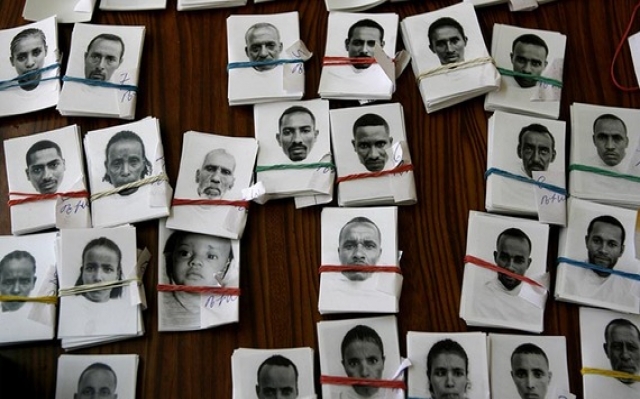 Passport pictures for Ethiopians, who are awaiting immigration to Israel, lie on a table in Gondar, March 8, 2007. (photo by REUTERS/Eliana Aponte)
Passport pictures for Ethiopians, who are awaiting immigration to Israel, lie on a table in Gondar, March 8, 2007. (photo by REUTERS/Eliana Aponte)
By Yuval Avivi
One Ethiopian folktale goes as follows: “A long time ago, Abba Gabra Hanna went to visit the village of Lalibla. Along the way, he met a jolly group. Someone in the group pointed at Abba Gabra Hanna’s large belly and said to his friends, ‘We have to thank this man for bringing with him a large, full bag of seeds. Our empty fields are waiting to be sown.’ The people in the group burst out laughing. Abba Gabra Hanna was insulted, but immediately had a thought. He pointed at the large, shiny bald head of the man and said, ‘I’m not sure if the amount of seeds I brought will be enough for this large, empty field.’ The people in the group burst out laughing. They knew that they had just met Abba Gabra Hanna, the famous joker.”
“For Ethiopian immigrants, Abba Gabra Hanna is the Ethiopian Hershele [a Hasidic joker in Ashkenazi folktales],” said Penina Tamanu-Shata, deputy chair of the Knesset and chair of the lobby for Ethiopians in Israel who came to Israel from Ethiopia when she was 3. “There’s a sense that Ethiopian culture is anemic, because our parents weren’t always literate, but the truth is that the literature of Ethiopian Jewry is developed — full of parables and complex and beautiful expressions. It’s simply a different kind of literature that is transmitted orally.”
While Israeli culture is based on reading books aloud to children, Ethiopian culture is based on telling folktales in Amharic. Abba Gabra Hanna is the hero of many of them, as seen in the collection of Ethiopian folktales, “A Web of Stories,” published in Israel in 2000.
As has happened many times in Israeli society when the collective has trampled on the unique character of immigrant communities, a large part of the cultural identity of Ethiopian Jewry has simply been erased. A 2013 study found that nearly half of Ethiopian households speak Hebrew only. The richness of Ethiopian folktales has thus been lost to them.
Read more at al-monitor.com »
—
Join the conversation on Twitter and Facebook.

























